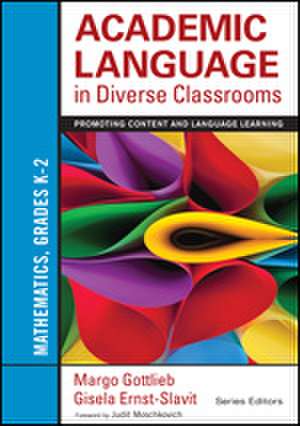Academic Language in Diverse Classrooms: Mathematics, Grades K–2: Promoting Content and Language Learning
Autor Margo Gottlieb, Gisela Ernst-Slaviten Limba Engleză Paperback – 22 apr 2013
Preț: 223.83 lei
Nou
Puncte Express: 336
Preț estimativ în valută:
42.83€ • 44.47$ • 35.72£
42.83€ • 44.47$ • 35.72£
Carte tipărită la comandă
Livrare economică 22 martie-05 aprilie
Preluare comenzi: 021 569.72.76
Specificații
ISBN-13: 9781452234816
ISBN-10: 1452234817
Pagini: 200
Dimensiuni: 178 x 254 x 15 mm
Greutate: 0.43 kg
Ediția:1
Editura: SAGE Publications
Colecția Corwin
Locul publicării:Thousand Oaks, United States
ISBN-10: 1452234817
Pagini: 200
Dimensiuni: 178 x 254 x 15 mm
Greutate: 0.43 kg
Ediția:1
Editura: SAGE Publications
Colecția Corwin
Locul publicării:Thousand Oaks, United States
Recenzii
“With growing numbers of English Language Learners in our classrooms, teachers need to be able to help students as they learn academic vocabulary and concepts. This series offers teachers a practical support, complete with abundant rubrics and detailed plans for teaching math vocabulary!”
“With the many visuals, charts, activity suggestions, and examples of student-teacher conversations, this series is a real-world resource for teachers.”
“The importance of academic vocabulary is often overlooked, or educators assume that students have a solid understanding of it. This series neatly explains why it is vital and demonstrates how it is possible to focus on vocabulary instruction that doesn’t take away from the conceptual lesson, but actually enhances it.”
“These volumes are packed with practical ideas that will help all teachers attend to language within their classrooms from the discourse level to word/phrase levels. This is a road map for teaching Common Core content in language rich classrooms, and hence a resource every teacher needs within arms reach! It’s all here and clearly presented; this is pure gold for everyone who teaches students to speak, listen, read and write in school, with special attention to English language learners.“
“Academic Language in Diverse Classrooms is an invaluable resource for all K through 8th grade teachers, especially those working with diverse students. This book gives teachers both a clear explanation of academic language and specific strategies they can apply in their own classrooms. Throughout the book, contributors provide specific connections between the Common Core State Standards and Language Development Standards. Each chapter helps educators understand students’ academic language needs and, through a variety of classroom examples from each grade level, shows teachers how to teach academic language through content. “
“With the many visuals, charts, activity suggestions, and examples of student-teacher conversations, this series is a real-world resource for teachers.”
“The importance of academic vocabulary is often overlooked, or educators assume that students have a solid understanding of it. This series neatly explains why it is vital and demonstrates how it is possible to focus on vocabulary instruction that doesn’t take away from the conceptual lesson, but actually enhances it.”
“These volumes are packed with practical ideas that will help all teachers attend to language within their classrooms from the discourse level to word/phrase levels. This is a road map for teaching Common Core content in language rich classrooms, and hence a resource every teacher needs within arms reach! It’s all here and clearly presented; this is pure gold for everyone who teaches students to speak, listen, read and write in school, with special attention to English language learners.“
“Academic Language in Diverse Classrooms is an invaluable resource for all K through 8th grade teachers, especially those working with diverse students. This book gives teachers both a clear explanation of academic language and specific strategies they can apply in their own classrooms. Throughout the book, contributors provide specific connections between the Common Core State Standards and Language Development Standards. Each chapter helps educators understand students’ academic language needs and, through a variety of classroom examples from each grade level, shows teachers how to teach academic language through content. “
Cuprins
Foreword by Judit N. Moschkovich
Preface
Acknowledgments
About the Editors
1. Academic Language: A Foundation for Academic Success in Mathematics by Margo Gottlieb and Gisela Ernst-Slavit
CCSS for Mathematics and Related Academic Language
2. Kindergarten: Making Sense of Number Sense by Catherine Carrison and Erika Muir
3. Grade 1: "Let's suppose that....": Developing Base-10 Thinking by Sylvia Celedon-Pattichis and Sandra I. Musanti
4. Grade 2: Evens and Odds: How Many in All? by Michael Silverstone and Debbie Zacarian
Glossary
Index
Preface
Acknowledgments
About the Editors
1. Academic Language: A Foundation for Academic Success in Mathematics by Margo Gottlieb and Gisela Ernst-Slavit
CCSS for Mathematics and Related Academic Language
2. Kindergarten: Making Sense of Number Sense by Catherine Carrison and Erika Muir
3. Grade 1: "Let's suppose that....": Developing Base-10 Thinking by Sylvia Celedon-Pattichis and Sandra I. Musanti
4. Grade 2: Evens and Odds: How Many in All? by Michael Silverstone and Debbie Zacarian
Glossary
Index
Notă biografică
Descriere
This title -- one of a seven book series -- will offer guidance to educators in how to target academic language in planning for student learning as states undergo the implementation of the Common Core and corresponding English language proficiency standards in preparation for the upcoming consortia-led assessments.
